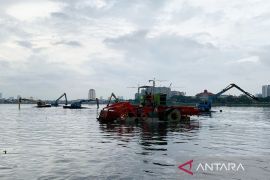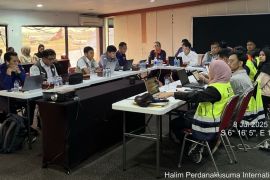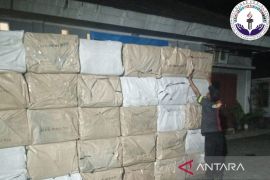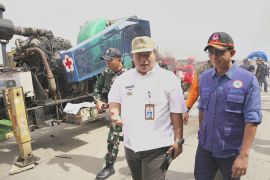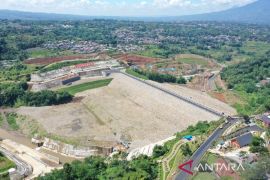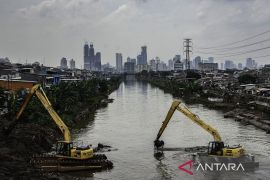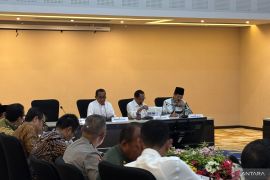with a population of around 10 million Jakarta is basically prone to annual flooding in every rainy season due among other things to poor drainage system and lack of water catchment areas. Besides, Jakarta lies in a lowland with 43 lakes and 13 rivers.
But, for most of Jakartans, the most traumatic floods are the cyclical ones that occur every five years.
In February 2007, floods had covered much of low-lying Jakarta and its suburban areas, killing around 85 people, forcing about 450,000 people to flee their homes, and causing nearly one billion US dollars worth of damage and losses.
Triggered by incessant heavy rains over several days in Jakarta and its neighbor cities especially Bogor, the 2007 floods were said to be the worst to hit Jakarta in history.
In January-February 2002, at least 20 people were killed and 340,000 made homeless by massive floods that had swept through Jakarta and surrounding cities including Bekasi and Tangerang.
Some Rp700 billion worth of infrastructure and around 100,000 houses were damaged in Jakarta alone.
This year`s rainy season in most parts of Indonesia has begun in October and will last until around March or April 2012.
As heavy rains fell in the capital city over last weekend, the Pondok Labu area located in south Jakarta, was flooded up to a height of two meters, forcing residents to flee to higher ground on Sunday (Oct 30). The Krukut river in Pondok Labu overflowed and inundated at least 239 houses.
The Indonesian Red Cross helped the local residents in the evacuation process and set up emergency tents to accommodate the flood victims.
Coordinating Minister for People`s Welfare Agung Laksono and Jakarta Governor Fauzi Bowo visited the flood-affected Pondok Labu on Monday (Oct 31), to get first hand information on the disaster.
"I wanted to personally witness conditions in the flooded area," Agung Laksono said.
The minister was informed that the flood was caused by river backfilling, in addition to incessant heavy downpours.
"As a result, the river became narrow causing the water during heavy rain to spill over and becoming a flood," he said.
Minister Agung called on local authorities to conduct regular checks on the river`s conditions and adjust the river`s width in order to prevent flooding in the future.
Governor Fauzi Bowo said the capital city would build another dam to overcome a chronic flood problem in the Pondok Labu area and its surroundings.
"We have prepared everything. In the long term, we will construct a dam there. Pondok Labu will definitely no longer suffer flooding when the dam is completed," Fauzi Bowo said.
The process to acquire land for the planned dam would begin next year, according to the governor.
Earlier, the government has constructed a 23.5-kilometer East Flood Canal that reaches the Java Sea and links five major waterways in East Jakarta, namely the Cipinang, Sunter, Buaran, Jati Kramat and Cakung rivers.
In anticipation of big floods that usually occur every five years in Jakarta, public policy observer Andrinov Chaniago has urged the government to mitigate the potential impacts.
"Natural disasters cannot be avoided, but the impacts should be anticipated by the government," Adrinov said here on Monday (Oct 31).
The anticipatory steps could include reconstruction of damaged culverts in the capital city, he said. "Jakarta`s drainage quality and capacity is not good enough," he said.
Serious floods could paralyze daily activities of Jakarta`s citizens, including in the business and education sectors, he said.
In normal conditions, it would take three days to go back to normal after flooding, but in Jakarta it could take more than three days, which indicated that there was something wrong with the drainage system, he added.
Andrinov said that until now the government`s anticipatory steps against big floods that usually come back every five years, were still not known.
A warning of potential major floods has also come from President Susilo Bambang Yudhoyono.
Before flying to France on Monday (Oct 31), the head of state asked Vice President Boediono and Governor Fauzi Bowo to address the flood problem in the capital city and to prevent the floods from spreading to wider areas like what were happening in Thailand and Myanmar.
He expressed hope that all related parties could prepare for the worst and do everything possible for precaution against the floods in Indonesia, especially in Jakarta.
Bloomberg reported that floodwaters have swept across 60 of Thailand`s 77 provinces over the past two months, swamping factories operated by Honda Motor Co. and Canon Inc. and destroying more than 10 percent of the nation`s rice farms. Thailand`s worst floods in more than 50 years have killed around 200 people.
In Myanmar, more than 100 people were killed in flash floods caused by heavy storms last week, AFP reported.
According to United Nations figures, monsoon rains have killed at least 700 people across Southeast Asia over the last two months.
Indonesia normally has two seasons, the dry and rainy season. But in 2010, La Nina-induced rainy season lasted the whole year, causing floods and landslides in a number of provinces.
According to the National Disaster Management Agency (BNPB) in January 2011, around 644 disasters had happened in the past year in which 1,711 people lost their lives throughout Indonesia.
Of the 644 natural disasters that occurred, 517 or 81.5 percent were hydrometeorological in nature. Geological disasters such as earthquakes, tsunami and volcanic eruptions happened 13 (2 percent), one (0.2 percent), and three (0.5 percent) times respectively. (*)
Reporter: By Fardah
Editor: Kunto Wibisono
Copyright © ANTARA 2011
